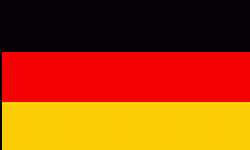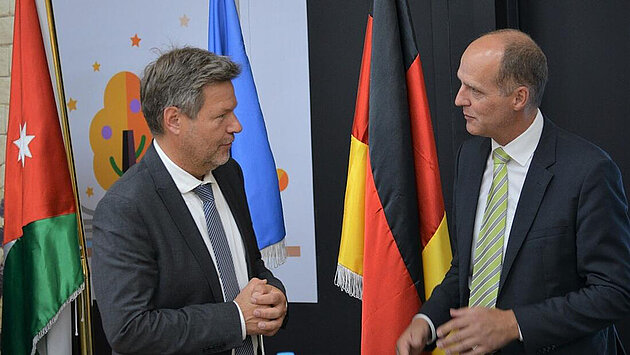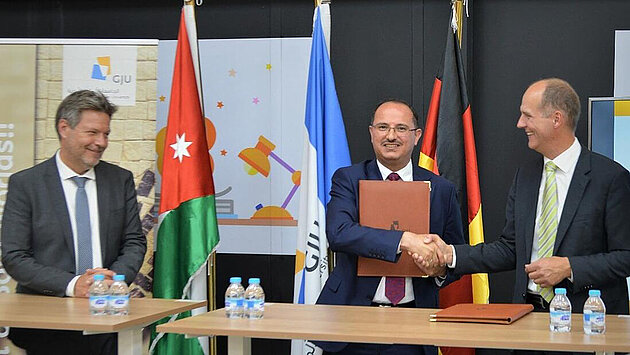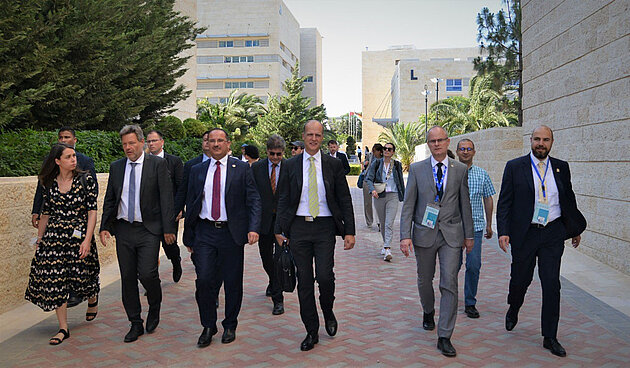Keep up to date
Keep up to date about everything that is happening at Campus GATE and find interesting articles and announcements below.
Habeck welcomes the cooperation between FHWS and GJU
06.08.2022 |
In the presence of Vice Chancellor and Federal Minister for Economic Affairs and Climate Protection Robert Habeck, the President of the University of Applied Sciences (FHWS), Prof. Dr Robert Grebner, and the President of the German Jordan University (GJU), Prof. Dr Alaaldeen Al-Halhouli, signed an agreement in Amman on 8 June 2022 to build a unique bridge between the sun-rich country of Jordan and Germany for prospective hydrogen technicians, who are indispensable for a green energy transition.
After successfully launching Germany's first bachelor's degree programme in hydrogen technology in Schweinfurt last year, the FHWS now wants to offer the same programme in Jordan. Students from Jordan and the Arab region will spend four semesters studying locally at the GJU in Amman and three semesters at the FHWS in Schweinfurt. They will be prepared for the German language by the GJU. The two universities also want to set up three identical hydrogen laboratories in Schweinfurt and Amman for the joint degree programme, so that the prospective hydrogen technology engineers can practise building and maintaining hydrogen plants.
"FHWS wants to make a contribution to the energy transition with the programme hosted by GJU. Sunny countries need engineers who are familiar with the use of hydrogen. Germany needs competent contacts in these countries as well as an influx of engineers, which is why the programme is also held in German," says Grebner.
"For Jordan, green energy production is an opportunity that the country must capitalise on. We are therefore delighted to have found a competent partner in the FHWS, who is working with us to train engineers. In any case, hydrogen technology is an important competence for both countries," explains Al-Halhouli. Several of the countries' concerns are being addressed at the same time. Jobs in the energy sector can contribute to stabilising the situation in the Middle East, the countries would benefit from exporting energy and Germany could source green energy.
Vice-Chancellor Habeck welcomes the commitment of the two universities and thanks the presidents of both universities for their close cooperation and their support in attracting skilled workers. After signing the agreement, Habeck took some time to speak to students at the Jordanian university and find out about their situation during and after their studies. From the students' point of view, the GJU is an excellent opportunity to prepare for working in Germany, even if the process of starting work in Germany with a foreign university degree is still too complicated.
The GJU is a Jordanian university sponsored by Germany, where all Bachelor students learn German and have to spend a total of one year in Germany for a six-month internship and one semester of study. With over 4,600 students and more than 15 undergraduate study programmes, the university is one of the three best-ranked universities in Jordan. The cooperation with the FHWS began many years ago.
With the former Vice President of the FHWS, Prof. Dr Ralf Roßkopf, who comes from Schweinfurt and moved to the Jordanian university as Vice President almost three years ago, the will to develop joint study programmes was significantly developed. "In addition to hydrogen technology, we also want to set up joint programmes in the fields of robotics and social work, which are very important for both regions," says Roßkopf.







